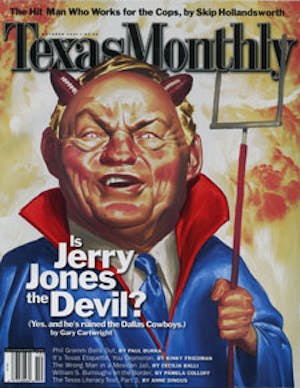When Texas railroad commission chairman Michael Williams ran for county attorney in Midland in 1984, he and his campaign manager were disturbed by a poll showing that 25 percent of the voters in the Republican primary would never vote for a black candidate. This was grim news for Williams, who is indeed both a Republican and an African American.
“That dictated our campaign,” recalls Williams, who was the chief prosecutor in the district attorney’s office at the time. “We ran a race where nobody saw me. I rarely got out. No picture—it wasn’t on anything. We just tried to tell every award I’d ever won.”
Three weeks before the election, he and his campaign manager looked at each other and agreed, “This is dumb.” But it was too late to recover. “We got stomped,” Williams says. The campaign manager? A local oilman named George W. Bush. “No offense to the president, but we ran a bad race,” Williams says, laughing.
Now, nearly two decades later, Texas is gearing up for an election cycle that will gauge how much of Midland’s 1984 attitude still exists across the state. Both political parties appear to be operating on the assumption that black candidates will strengthen their ticket. The Republican slate will feature at least two high-profile black incumbents—Williams and Wallace Jefferson, who became the first black justice on the Texas Supreme Court when Governor Rick Perry named him to fill the vacancy left by new White House counsel Al Gonzales. And prominent Democrats spent the summer urging Dallas mayor Ron Kirk to run for the U.S. Senate seat held by Republican Phil Gramm, who has since announced his retirement.
Democrats believe that the presence of the popular Kirk on their ticket, along with Laredo banker and oilman Tony Sanchez, Jr., who is challenging Republican incumbent Rick Perry for governor, would awaken a core constituency that has slumbered through the past few election cycles. Buoyed by census data showing an explosion in the Hispanic population and polls showing that Texas now ranks second only to New York in black population, Democratic strategists say the key to winning back some statewide offices—all now held by Republicans—is increasing the turnout of minority voters. In 1998 Democrats Paul Hobby and John Sharp narrowly lost their bids for comptroller and lieutenant governor, respectively, a showing attributed to an anemic Hispanic turnout—26.7 percent of their registered voters, down from 34.4 percent in the previous election, when incumbent attorney general Dan Morales was on the ballot. A Democratic Dream Team headed by Kirk and Sanchez, the theory goes, will draw huge numbers of African Americans, 90 percent of whom vote Democratic, and Hispanics, who also vote overwhelmingly Democratic, to the polls.
This wishful thinking may never become more than just that: At press time, Kirk had not yet decided whether he would make the race. Even if he runs, Dan Morales has expressed interest in running for the Senate seat, which means that Kirk would have to wage an uphill primary battle against a better-known opponent to win his party’s nomination. Whether or not Kirk runs, Republicans hope the inclusion of Williams and Jefferson on their slate will cut into a traditionally Democratic constituency, as well as attract some Anglo independents.
At first blush, Williams’ election in November 2000 to the Railroad Commission put to rest the question of whether a black candidate can win an important statewide office in Texas. (Two black judges have served on the Texas Court of Criminal Appeals.) But his success came under circumstances that would be difficult for other black candidates to duplicate: He was an incumbent, appointed by Bush to fill an unexpired term on the commission, and the clear endorsement by a popular presidential candidate prevented the emergence of a serious Republican primary challenger. But Williams also believes his ethnicity “was an advantage”—unlike in 1984 Midland.
“I felt a huge excitement among Republicans over being able to go into the voting booth and vote for an African American. I got the benefit of that wave,” he says. It also didn’t hurt that Williams has had a long history with the Republican party. He served as the state party’s general counsel and worked for the Justice Department under presidents Ronald Reagan and the elder George Bush. “There was no question about my Republican credentials and, at the same time, almost a hunger on behalf of Republican primary voters to vote for an African American, in part to show that the presumed bias did not exist. I made an investment in the party, and I had the background and experience—that’s the formula.”
In his 2000 campaign, Williams’ picture appeared on all his literature, with him wearing his signature bow tie. He ran TV ads and made as many public appearances as possible. “In 2002 we’ll make a conscious effort to generate voters in the African American community. There’s an African American advisory group as part of Team Williams,” he says.
Williams says he feels a responsibility to seek contacts with African Americans throughout the state “even if it doesn’t come within the four corners of the responsibilities of the Railroad Commission.” He helps circulate young black professionals’ résumés, tries to funnel grants to historically black colleges like Prairie View A&M, and searches hard for qualified black applicants when hiring at the commission.
The Texas Railroad Commission regulates the state’s oil and gas industry, which is not a typical minority concern. Still, Williams has identified a few issues in which he’s taken a stand that could be called pro-minority. “With pipeline safety rules, we put a priority on testing in high-density neighborhoods, and many of those are going to be low-income areas,” he says. “During the natural gas price spike, we passed emergency rules that said you can’t cut folks off [for nonpayment of a bill] in the dead of winter.”
The son of two Midland schoolteachers, Williams proudly claims to be a “second-generation Republican.” Despite black voters’ loyalty to the Democratic ticket, Williams says he believes he’ll draw many of those voters to the Republican slate. “If we tell the Michael Williams story, we will be able to attract those voters,” he says. As a federal prosecutor in the criminal section of the Justice Department’s civil rights division, Williams won convictions of nine members of the Ku Klux Klan on charges involving stolen military weapons and other violations. A security detail was assigned to him after he received death threats. “That has nothing to do with the Railroad Commission, but it does have something to do with who I am,” he says.
Like Williams, Kirk is an attorney whose career has been spent mostly in public service. A former aide to retired U.S. senator Lloyd Bentsen, whom he still idolizes, Kirk served as a Dallas assistant city attorney, lobbying the Legislature for the city. He was appointed Secretary of State by Governor Ann Richards before joining the prestigious Dallas law firm of Gardere and Wynne. After years of racial tension that permeated civic issues in Dallas, the city’s business establishment got behind Kirk in 1995 in hopes of uniting the minority community under the leadership of a pro-business African American. Kirk won the race with about 42 percent of the Anglo vote. “That was cool,” he says.
In a July interview, while he was still facing the possibility that Gramm would run for reelection, Kirk traced the recent demise of the Democratic party to Bentsen’s retirement from politics. “We yielded the debate about being business-friendly. You can’t have a party that business is afraid of.”
In 2002, though, Kirk believes that Democrats, with the right ticket, “could excite a core group that hasn’t had a reason to go to the polls to vote.” And after years of election defeats, he believes Democrats are ready to coalesce. “There’s nothing like being out of office for eight years to make you sit down and shut up and put your personal agendas aside. We’re going to have enough choir books this year, and we’re all going to be on the same page.”
Kirk also believes that African Americans still harbor residual resentment about the stories of disenfranchisement of Florida’s black voters in the 2000 presidential election. “That could be an incredibly motivating factor. You combine that with a candidate who can appeal to business—that’s a prescription for a revival of the party,” he notes.
Kirk possesses charisma and easy humor; much like Ann Richards, he excels at repartee: “Not a day goes by that somebody doesn’t tell me I ought to switch parties. I always say, ‘Why don’t you switch parties? In the Republican party, you’re just another white boy; in the Democratic party, you’d be something special.'”
One reason why the Democrats need both Kirk and Sanchez on the ticket is that recent history suggests that Hispanics will not turn out solely to vote for black candidates and vice versa. Veteran Democratic pollster Jeff Montgomery, of Austin, believes the two groups view each other with suspicion and mistrust: “Oftentimes competing minority groups look at each other as reaching for the same piece of the pie,” he says. “They believe if one is gaining ground, the other is losing.” There’s little history in Texas of blacks’ and browns’ uniting behind each other’s candidates. In 1991 Houston businessman Bob Lanier defeated state representative Sylvester Turner, an African American, to become mayor with the help of Hispanics. In this year’s Los Angeles mayor’s race, a similar phenomenon occurred when Anglo James K. Hahn defeated Hispanic Antonio Villaraigosa with huge support from African Americans. Hahn received more than 70 percent of the black vote.
Kirk doesn’t buy it. First of all, he notes, he has succeeded in Dallas’ “tri-ethnic” environment. “Let’s not buy into this ‘most-favored minority’ thing. Let’s move into coalition-building—the shared journeys we have made,” he says.
While no one believes racial bias has magically evaporated since Williams’ 1984 race, political experts from both parties believe that people are too sophisticated to answer yes to a poll question about whether race would influence their vote. “Unfortunately, people are automatically going to say it doesn’t affect them,” says Republican consultant Reggie Bashur. Bashur points to two North Carolina U.S. Senate election contests between African American Harvey Gantt and incumbent Jesse Helms. “The surveys were much different from what actually occurred when people voted. There was a huge drop-off in voting for Gantt from what the polls had predicted.”
Bashur believes that Kirk—or any black Democrat—faces a greater disadvantage in Texas than skin color: party affiliation. “Republicans have a ten percent advantage in Texas,” he notes. Bigger turnout by Hispanics and African Americans would “chip away one or two percent—not enough to overcome the kind of deficit they face.” And while Democrats bemoan their poor turnout in 1998, Bashur notes that turnout was down among Republicans as well.
Williams’ election aside, Democrats like state senator Rodney Ellis, of Houston, himself an African American, worry that a glass ceiling exists for African Americans who seek higher state offices. Though Democrats have tried to talk Ellis into making a statewide race, he’s not convinced the time is right. “It would be an uphill battle,” he says. “Somebody has to have the courage to roll the dice and test it. A good number of people in Texas would like to vote for an African American. I just don’t know if that number gets to a majority.”







